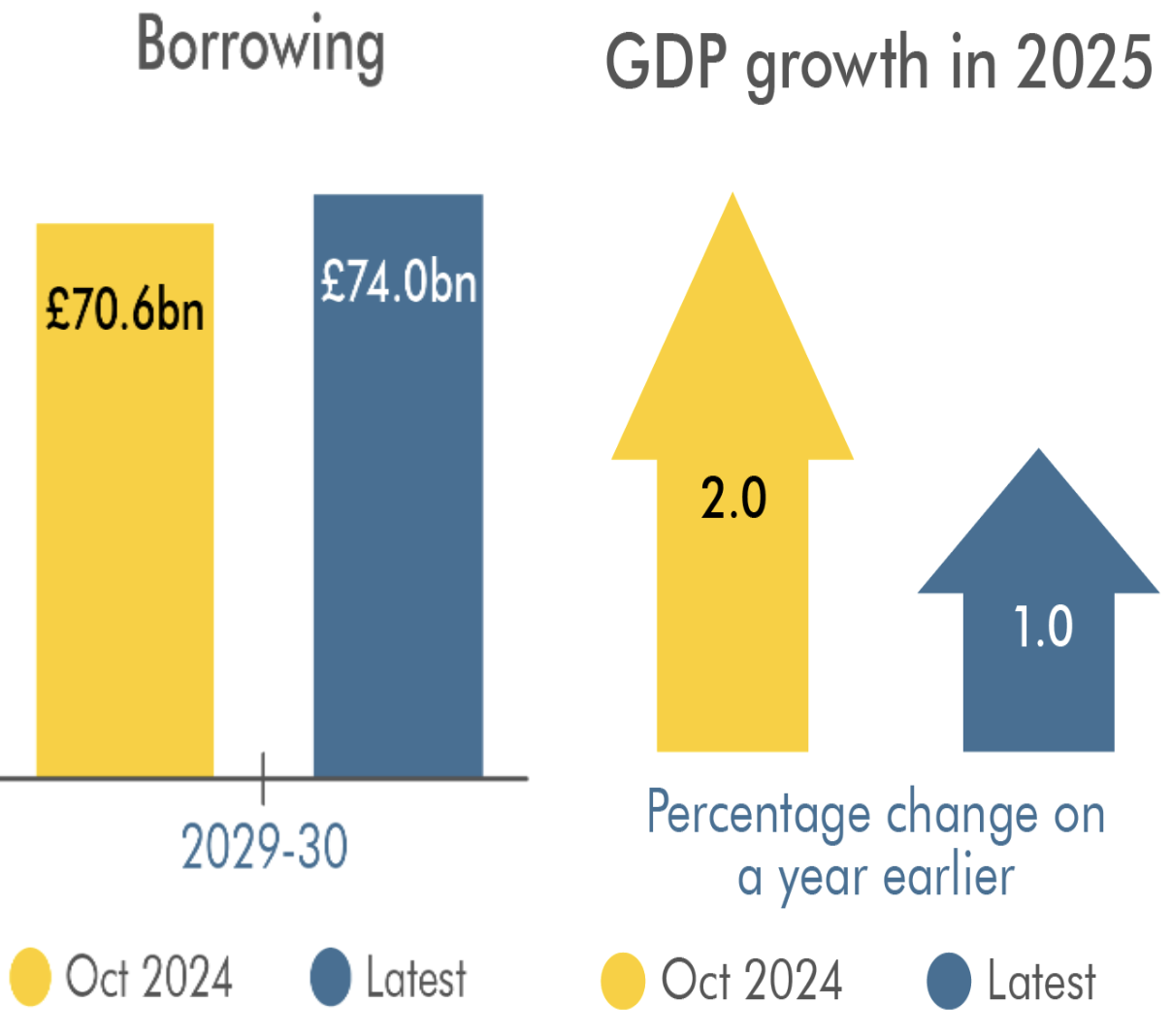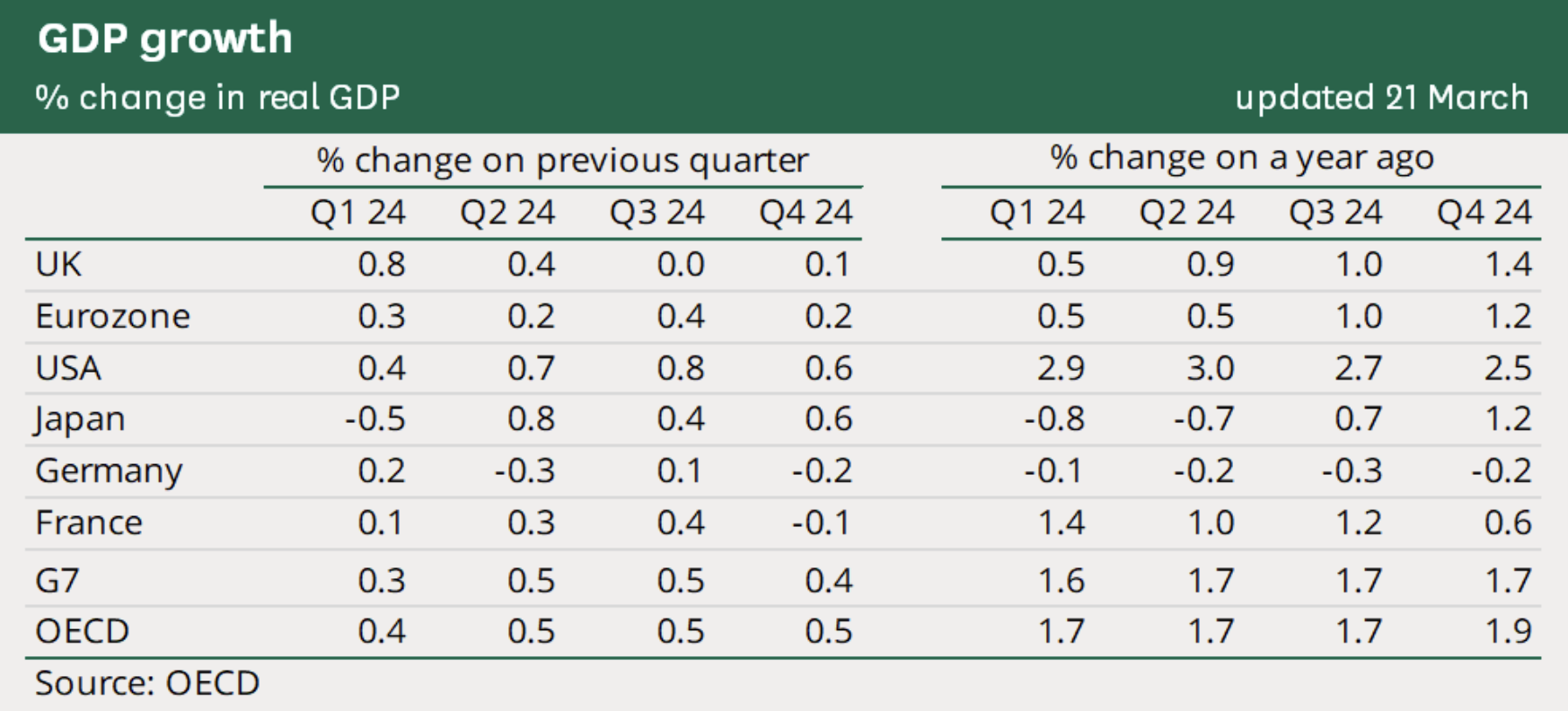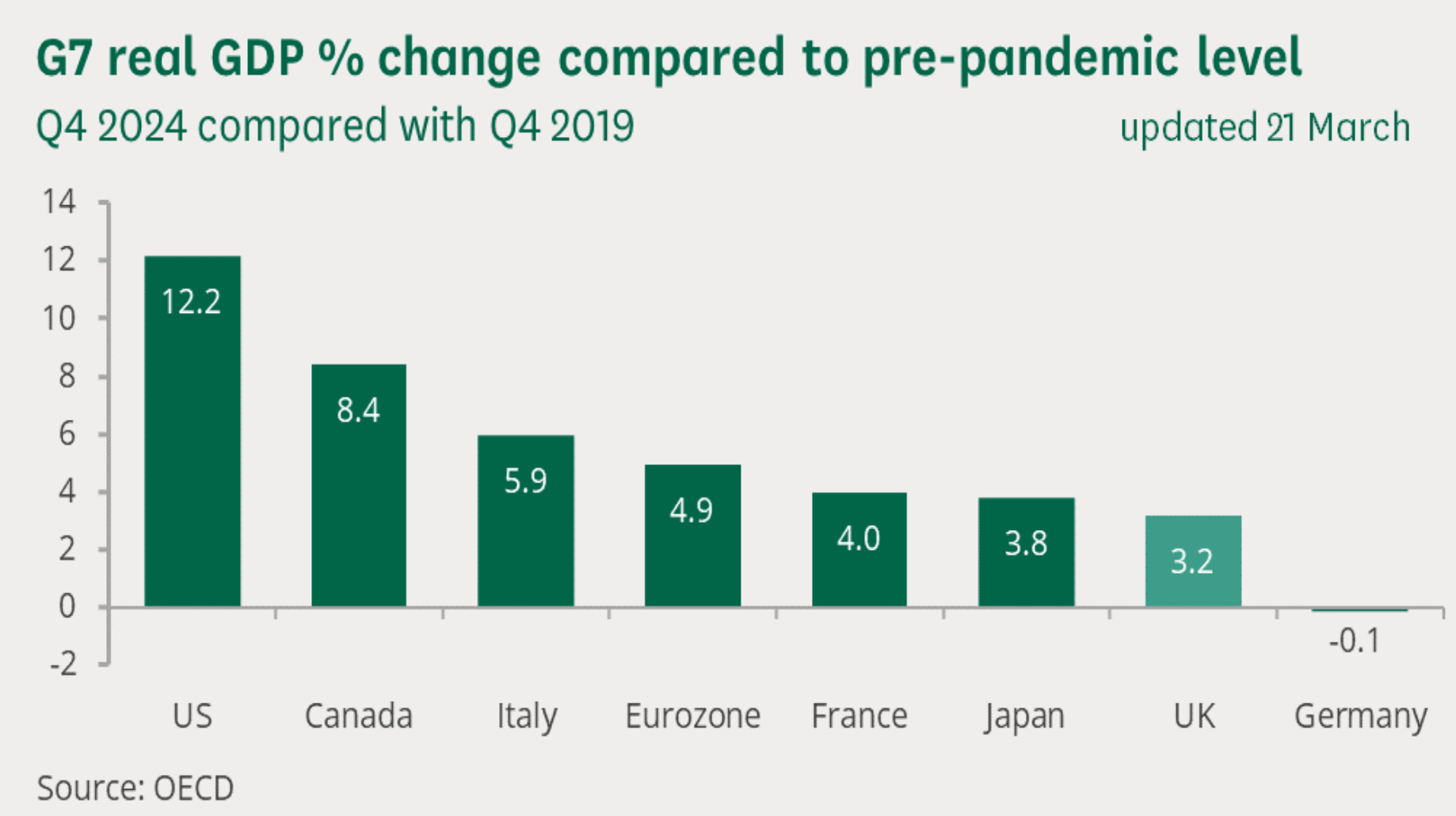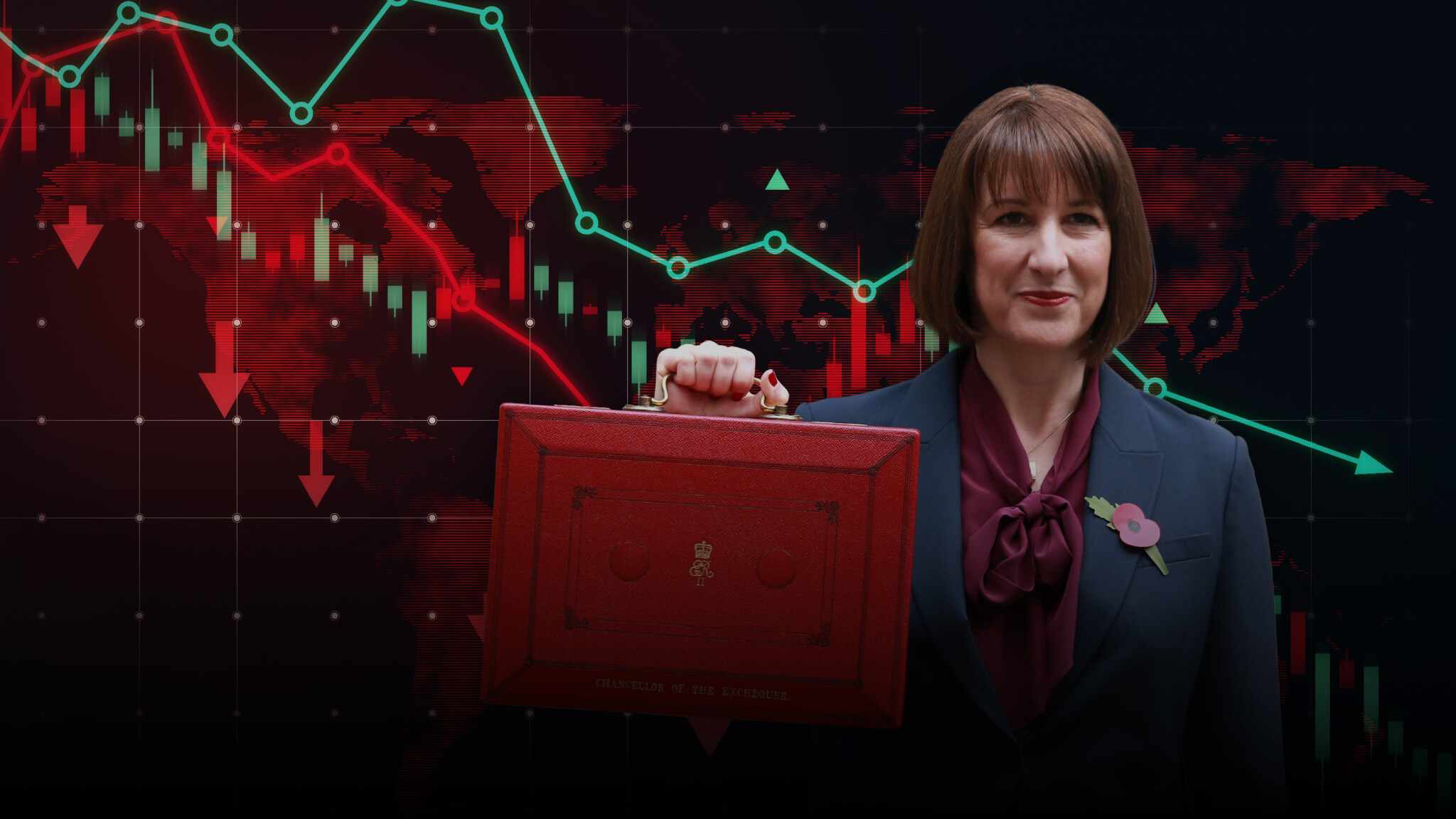Labour’s spring statement went down like a brick in a duck pond yesterday, with MPs, businesses, and financial regulators alike. Growth forecasts are falling faster than Keir Starmer’s popularity, and seen more revisions than Chancellor Rachel Reeves’ CV. The Office for Budget Responsibility (OBR) halved its projection for GDP growth from 2% to 1% for this fiscal year, in less than six months. Borrowing increased by £15 billion since April 2024; £20 billion more than the OBR forecast in October 2024, and £3.4 billion more since Reeves’ first budget in October 2024. The government will borrow £18 billion more than projected over the next two years: double the £5 billion per year potential savings from cuts to welfare, which Labour’s large socialist cohort have threatened to rebel against. (They insist on having 25% of the working-age population claiming disability benefits, and an ADHD diagnosis qualifying you for a brand new BMW.) Spending continues to rise to £1.3 trillion per year, despite the cost of borrowing increasing by 0.75 percentage points since the election. 10 year GILT rates today are 4.72% — higher than the spike coinciding with Liz Truss’ mini-budget in 2022, which Labour continue to claim “crashed the economy.” Isn’t it odd how nobody is knocking on Downing Street, demanding Starmer and Reeves resign?

Source: obr.uk
Britain is still on track to fall afoul of Ferguson’s Law: that any state which spends more on servicing the interest on its debt (over £100 billion) than on defense (£5 billion, up to 2.5% of GDP from April 2027) will inevitably fail. Signs of that financial Thucydides Trap have long since been written on the Treasury’s wall. The UK was the fastest growing economy in the G7 before Labour won the election; but with GDP growth falling from 0.8% in the first quarter to 0.1% in the last of 2024, we are now projected to be third for 2025. We have the worst real GDP percentage change post-pandemic of any G7 country except Germany, whose economy has shrunk in real terms by 0.1%. While our debt-to-GDP has fallen under 100% since August 2024, we have reached debt-to-GDP parity faster than G7 countries like Italy, who have been there for decades.


Source: commonslibrary.parliament.uk
Despite GDP-per-capita continuing to decline since the 2008 financial crash, and the UK without London being poorer than every US state, Reeves continues to rely on socialist economics to insist that the state spending more money translates into GDP growth. Reversing the Conservatives’ plan to cut government department expenditure by 0.7% by 2029, Reeves announced in autumn that day-to-day departmental spending would increase 2.0% per year in real terms — and that this would increase GDP. It appears Labour’s grasp of economics really is as basic as: if the government spends money, this causes growth.
Indeed, Telegraph economist Liam Halligan relayed a story wherein a senior Labour politician said that the government could conduct “quantitative easing [digital money-printing] for the people” in order to give consumers more money to spend, thereby growing the economy, with absolutely no thought for how that might increase inflation. Former Reform MP Rupert Lowe had a similar exchange with a Labour minister, who said he believes the public sector (civil service) is more productive than the private sector (businesses). Lowe terminated the meeting. Another Labour MP, Jonathan Brash, took a swipe at me on X once, when I shared footage of Jeremy Clarkson calling for unproductive roles across Whitehall to be cut in order to save money, rather than pursuing a Marxist grave-robbing inheritance tax on family farms. Labour’s ideology appears to be that of the Soviet Union: that paying one factory to make the right boot, and another the left, results in more economic output.
Enjoy independent, ad-free journalism - delivered to your inbox each week
The government has it all backwards, as demonstrated by their oxymoronic promise to “regulate for growth”. Indeed, their plan to further regulate businesses with their Employment Rights Bill, euphemized as protecting “workers rights”, was not included in the OBR’s long-term economic forecast. The only comment the OBR made about the bill was:
“Employment regulation policies that affect the flexibility of businesses and labour markets or the quantity and quality of work will likely have material, and probably net negative, economic impacts on employment, prices, and productivity.”
The government’s own estimates project the bill will impose an additional £5 billion per year on businesses — which many will look to offset by limiting expansion, cutting new or existing hires, and thereby shrinking the economy. No wonder business confidence is at a record low, the CIPD forecast 25% of employers to make redundancies, and OBR believes unemployment will rise to 4.5%. In 2024, 10,800 emigrated from the UK. This is a 157% increase on 2023, and more than any other country except China. Britain’s economy is hemorrhaging opportunities and talent, and yet Labour insists on their high-tax, high-spend socialist orthodoxy anyway.
What could be done to change this? Britain continues to have the highest energy prices in the developed world, and will face a >£3 trillion bill for renewables in the next 25 years. Labour have further penalized oil and gas extraction by filling the last of Britain’s fracking wells with cement. Leader of the opposition, Kemi Badenoch MP has finally recognized the carcinogenic effect of the 2050 net-zero target on Britain’s economy, and announced at a press conference last week her intent to scrap it, should the Conservatives win the next election. Nigel Farage’s Reform party has made the same promise for years. Meanwhile, Energy and Climate Change Secretary, Ed Miliband has pledged another £200 million to subsidize solar panels installed on schools and hospitals. Inconveniently, China produces 80% of the global supply of solar panels; which explains why Labour voted to block a ban on imports made by Chinese slave labor. The imprisoned Uyghur minority in Xinjiang produce 40% of polysilicon, used in solar panels. It seems Starmer’s government is comfortable with human rights abuses abroad, in order to inflict higher energy costs and lower living standards on British people at home.
Inconveniently, China produces 80% of the global supply of solar panels; which explains why Labour voted to block a ban on imports made by Chinese slave labor. The imprisoned Uyghur minority in Xinjiang produce 40% of polysilicon, used in solar panels. It seems Starmer’s government is comfortable with human rights abuses abroad, in order to inflict higher energy costs and lower living standards on British people at home.
Mass immigration is another unaffordable, unpopular policy that Labour could end. Despite branding the post-Brexit “Boriswave” of a million-plus non-EU migrants every year as a “one-nation experiment in open borders”, Starmer has stuck his lab-coat on and continued it. 95% of visas are issued to net-tax recipients; costing taxpayers at least £465,000 each. Granting the Boriswave indefinite leave to remain (ILR) will cost taxpayers £234 billion (£8,200 per household). Home Secretary Yvette Cooper could revise ILR rules without primary legislation, and ensure this cost never befalls British taxpayers. Instead, as former Chancellor Lord Hammond told Sky News, the government will continue “managed migration” in order to meet its housebuilding target of 1.5 million new homes by 2029.
"In order to deliver the growth effect, there will have to be some additional managed migration."
— Connor Tomlinson (@Con_Tomlinson) March 26, 2025
Former Chancellor, Lord Philip Hammond showing on Sky News how ideological the Westminster economic orthodoxy is.
Despite 95 percent of annual immigrants being net-tax recipients,… pic.twitter.com/oLKy8HRqpP
House prices will continue to rise, however, because the OBR expects at least 1.5 million migrants to enter Britain over the same period (previous OBR modelling has underestimated annual net migration by a factor of four). As deputy Prime Minister Angela Rayer conceded on Sky News, 70% of new homes will be given to new migrants. Additionally, Labour will portion thousands of these new homes as “dispersed accommodation” for the thousands of illegal immigrants crossing the English Channel in small boats. Over 6,100 illegal migrants have crossed the Channel this year already, a 40% increase (30,300) since Starmer took office. A document published by the Treasury’s new Office for Value for Money says that some of the promised 1.5 million new homes will be used for “asylum seekers” — costing taxpayers £14 a night, rather than hotels at £145 per night. This is part of “Operation Scatter”: Rayner’s plan to “equitably” disperse illegal migrants across all the boroughs of Britain. Rather than impose predatory men on locals areas to loiter outside school gates, Labour could leave the ECHR, repeal the Human Rights Act (much to Starmer’s chagrin), and deport these dangerous foreign criminals to save the taxpayer billions.
Help Ensure our Survival
Only slaying the leviathanic civil service, mass-deporting illegal immigrants, banning foreign nationals from receiving benefits, and unleashing new nuclear and North Sea oil and gas will get the economy out of the doldrums. But neither abandoning net zero, nor ending unproductive immigration and expelling foreign criminals, appear to be on the table for Labour. So, Britain will continue to suffer economic woes, imposed on a long-suffering population by government policy.

If Labour cannot address these very hard truths, the “great” in Great Britain may never be restored.




Comments (0)
Only supporting or founding members can comment on our articles.